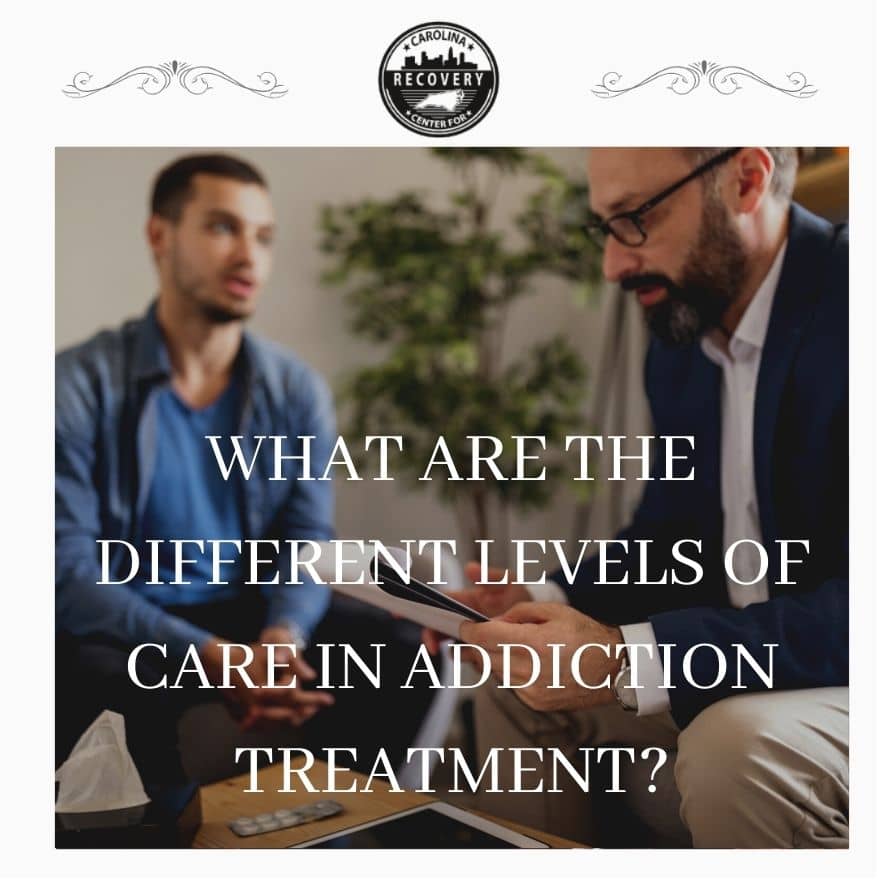What Are The Different Levels of Care in Addiction Treatment?

Medically Verified: 2/1/24
Medical Reviewer
Chief Editor

All of the information on this page has been reviewed and verified by a certified addiction professional.
Addiction is a complex disease that can take a long time to recover from. The longer a person stays sober and sticks to their recovery program, the more confident and independent they become in their recovery. Many addiction treatment centers in North Carolina use a “continuum of care” approach that allows patients to “step down” to lower levels of care as they stay sober and progress in their recovery journey.
The various levels of care in addiction treatment help individuals transition from higher levels of more intensive care to lower levels of more flexible care. Knowing what each level of care is like can help inform individuals of the treatment process and what to expect during rehab.
Inpatient Hospitalization (Detox)
The highest, most structured level of care is known as inpatient hospitalization or detox. This is usually the first step of the recovery journey as it involves detoxing from drugs and alcohol under the close supervision of medical professionals. Detox helps stabilize the mind and body, allowing individuals to get prepared for rehabilitation.
During detox, patients stay in a medical setting where they are under constant monitoring and supervision of nurses and medical staff. Doctors may prescribe medications to reduce the severity of withdrawal symptoms and alleviate discomfort. Most people spend 3-10 days in inpatient hospitalization depending on the severity of their withdrawal symptoms.
Residential Treatment
The next level of care is known as residential treatment or inpatient rehab. Patients may transition to residential treatment after they have been stabilized in detox. During residential, patients live at the treatment facility and are supervised by behavioral health technicians. They spend their days participating in group and individual therapy, support groups, and holistic healing services.
Residential treatment programs have the most structure of all the levels of care in addiction treatment. Patients wake up at the same time every day, take their medications, go to therapy in the clinical building, and participate in other activities at night. Residential programs remove individuals from their usual environments and triggers so they can focus completely on their recovery.
Short-term residential programs can last as little as 14 days, but most last 30, 60, or 90 days. Some extended care programs will last even longer.
Partial Hospitalization Program (PHP) or Day Treatment
The next step down from residential treatment is known as partial hospitalization (PHP) or “day treatment.” PHP can be viewed as a full-time job. Patients go to the treatment facility for therapy, usually Monday-Friday, and participate in 20-30 hours of treatment each week. They participate in many of the same services they did in residential treatment, however, they are able to return home in the evening.
PHP gives patients a similar structure as residential, but more freedom since they get to live at home or in sober living. PHP is often viewed as a brief, transitional program that individuals participate in as they move from inpatient to outpatient rehab. People may spend anywhere from one week to three months in PHP.
Intensive Outpatient Program (IOP)
Intensive outpatient programs (IOP) are considered a step down from PHP or day treatment. During IOP, patients can live at home, go to work, care for their families, or continue their education while obtaining treatment for addiction. Patients attend therapy 4-5 days each week with each session lasting 2-3 hours at a time. This makes for a total of 8-15 hours of therapy each week. IOPs usually consist of several group therapy sessions and one individual therapy session weekly.
Patients may remain in IOP for as long as is needed. The duration of the program can range from 30 days to six months, but most patients average somewhere in between.
Outpatient Program (OP)
After finishing IOP, many patients transition down to an outpatient program (OP). OPs usually require patients to go to treatment 2-3 days a week for 1-2 hours at a time, totaling 2-6 hours of therapy each week. OPs often focus on relapse prevention, life-skills training, and healthy coping skills. They can help guide individuals on their recovery journey without taking away any of their independence.
Like IOP, patients may remain in OP for as long as they need to. This ranges from 1-3 months for most people.
Aftercare Services
After finishing the above-listed levels of care in addiction treatment, all patients can benefit from aftercare services. Although aftercare is not considered an actual level of care, it can help provide patients with structure and support as they navigate life in early recovery. Examples of addiction treatment aftercare services include:
- Alumni programs
- Counseling
- Sober living
- 12-Step meetings
- Recovery coaching
Most people can benefit from participating in aftercare for at least one year after finishing rehab, but many stay active in some form of aftercare throughout their recovery.
Find The Addiction Help You Deserve Today
If you or a loved one are struggling with addiction, our team at Carolina Center for Recovery is happy to help. Our family-owned and operated addiction treatment program aims to address each patients’ unique needs to help them achieve their personal goals. We use a variety of evidence-based therapies and techniques that can help you heal from addiction and any mental health conditions you may struggle with.
Don’t wait any longer. Help is just a phone call away. Call now to speak with one of our compassionate admissions coordinators.

